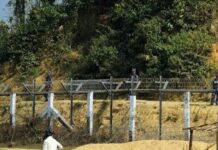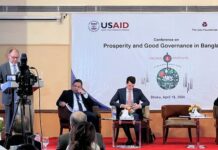
Bangladesh and India have agreed to collaborate in new areas of cooperation like environment, climate change, cyber security, ICT, space technology, green energy and blue economy.
This was stated in a joint statement released today (September 7, 2022) after Prime Minister Sheikh Hasina held comprehensive talks with her Indian counterpart Narendra Modi in New Delhi on the second day of her four-day state visit to India.
The two leaders held discussions on the entire gamut of bilateral cooperation, including political and security cooperation, defence, border management, trade and connectivity, water resources, power and energy, development cooperation, cultural and people-to-people links.
They also discussed the various aspects of regional and global issues of interest, reports our New Delhi correspondent.
Bangladesh Prime Minister Sheikh Hasina and Indian Prime Minister Narendra Modi at Hyderabad House on September 6, 2022. Photo: Twitter/@DDNewslive
Keeping in mind the impact of Covid -19 pandemic and the supply chain disruptions due to global developments, Hasina and Modi emphasised the need for greater collaboration in the spirit of friendship and partnership for prosperity and development of the region.
The two Leaders underscored the importance of implementing bilateral and sub-regional rail, road, and other connectivity initiatives.
Both sides welcomed the ongoing bilateral initiatives, such as, conversion to dual-gauge of Tongi-Akhaura line, supply of railway rolling stock, capacity building for the personnel of Bangladesh Railway, sharing of IT solutions for improved services of Bangladesh Railway and many others. Both sides also welcomed the new initiatives of Kaunia-Lalmonirhat-Mogalghat-New Gitaldaha link, establishing a link between Hili and Birampur, upgradation of track and signalling systems and railway stations along the Benapole-Jashore line, link restoration between Burimari and Changrabandha and construction of a container depot at Sirajganj.
Both sides agreed to explore funding of these projects through a range of financial instruments under the bilateral development cooperation.
The Bangladesh side welcomed the gesture of India for providing 20 broad-gauge diesel locomotives on grant.
Noting the growth in bilateral trade with India emerging as the largest export destination for Bangladesh in Asia, the Bangladesh side requested the Indian side for ensuring predictable supply of the essential food commodities from India such as rice, wheat, sugar, onion, ginger and garlic.
The Indian side responded by saying Bangladesh’s requests will be favourably considered based on prevalent supply conditions in India, and all efforts will be made in this regard.
Bangladesh and India have agreed to strengthen sub-regional cooperation in the power sector, and Bangladesh requested for import of power from Nepal and Bhutan through India.
The Indian side said the guidelines for the same are already in place in India.
Hasina and Modi reviewed the progress made on the India-Bangladesh Friendship Pipeline that will contribute to addressing energy demands of Bangladesh and expressed hope that the project would be completed at the earliest.
The Bangladesh side also requested the Indian side to assist in meeting its domestic requirement for petroleum products and India agreed to facilitate discussions between the authorized agencies of both sides.
The Indian side also welcomed the decision of the Bangladesh side to enlist Indian Oil Corporation Ltd (IOCL) as a registered G2G supplier of refined petroleum products to Bangladesh.
In the spirit of enhancing sub-regional cooperation, the two leaders agreed to expeditiously implement projects to connect the two countries’ power grids synchronously, including through the proposed high capacity 765KV transmission line from Katihar (Bihar) to Bornagar (Assam) through Parbatipur in Bangladesh, to be made through a suitably-structured India-Bangladesh joint venture for a special purpose vehicle.
The two leaders welcomed the successful completion of trial runs under the Agreement on the use of the Chattogram and Mongla Ports (ACMP) and looked forward to its full operationalisation at the earliest.
The Indian side reiterated its request to work towards the expansion of the bilateral Coastal Shipping Agreement of 2015 to include third-country EXIM cargo. The two sides also agreed to expeditiously explore direct shipping links between the two countries.
The Indian side requested Bangladesh to complete remaining infrastructure, immigration, and customs facilities for the operationalisation of the Maitri Bridge over river Feni connecting Tripura with Bangladesh, at an early date.
The two leaders agreed to expedite efforts to improve bilateral and sub-regional connectivity through early operationalisation of the Bhutan-Bangladesh-India-Nepal Motor Vehicle Agreement.
In the same spirit, Bangladesh reiterated its eagerness to partner in the ongoing initiative of the India-Myanmar-Thailand trilateral highway project.
The leaders stressed on the effective implementation of the 2011 MoU on ‘Conservation of the Sundarbans’ including through the convening of the JWG at the earliest, so that the ecosystem of this deltaic forest and the people dependent on this ecosystem can live sustainably.










